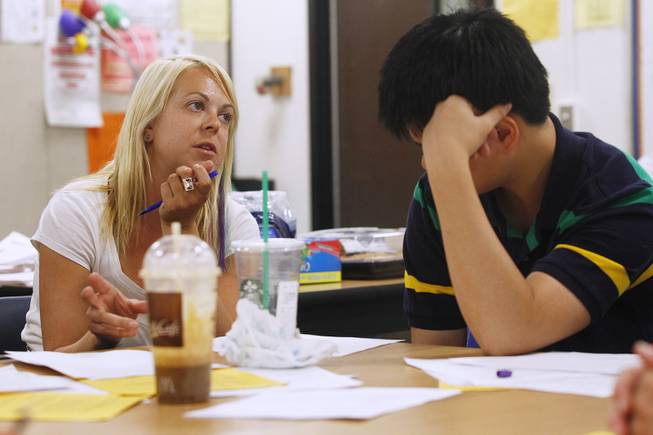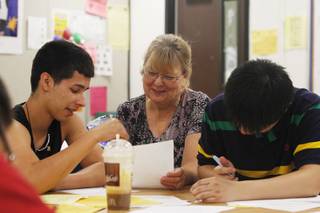
Teacher Ashley Nebe helps a student with a writing assignment during summer school class Friday, July 5, 2013 at Clark High School
Thursday, July 11, 2013 | 2 a.m.
They came to school in the searing summer heat, armed with high hopes and steeled resolve.
It’s early on a recent Friday morning, the last day of summer school for some 60 students at Clark High School in the central Las Vegas Valley. For the past three weeks, these students — all seniors — have been attending a "boot camp" to prepare for the High School Proficiency Exam.
In the coming days, these teenagers will have one last chance at cracking the so-called proficiencies, which test students' reading, writing, math and science knowledge.
The ones who pass will join their peers who graduated the month before. The ones who don't will struggle. Without a high school diploma, these students can't go to college or vocational school. They likely can't find well-paying jobs. They can't even serve in the military.
Sun coverage
Summer School
This summer, the Clark County School District offered summer school at 14 high schools: Arbor View, Basic, Boulder City, Canyon Springs, Cimarron-Memorial, Clark, Del Sol, Eldorado, Las Vegas, Legacy, Palo Verde, Rancho, Sierra Vista and Silverado.
About 1,300 seniors from across the district participated in the summer school program, which allowed them to retake courses for credit and prepare for the High School Proficiency Exam. The approximate cost for the summer proficiency boot camps was about $100,000, which went toward supplies, facilities, teachers and staff.
The High School Proficiency Exam is being replaced by new end-of-course exams. These seniors will be one of the last classes to take the proficiencies.
This daunting reality weighs heavily on the students as they sit, quietly scribbling away, in Ashley Nebe's writing class.
The six students have yet to crack the writing section. It's arguably the most difficult of the proficiencies, particularly for the growing number of non-English-speaking students in Clark County.
"English is the most difficult language to learn in the world," says Nebe, Clark High's English department chairwoman. "There are so many rules and then words that don't follow the rules."
To pass the writing section, students must write two one-page essays: one explanatory, the other persuasive. The students have all school day to finish the exam, which will be graded by four teachers on spelling, grammar and adequately answering the writing prompts.
Students can't guess any answers or eliminate the wrong ones — there are no multiple choice questions.
For the next several hours, the students will review practice prompts and the steps to write an effective essay. The pupils are taught to read the prompt carefully and to brainstorm and pre-write their answers before starting their essays.
Nebe and colleague Jodi Wilde offer encouragement and test-taking tips throughout the lesson. After all, the anxiety of passing these high-stakes tests can become overwhelming, acknowledges Steve Perry, Clark's dean of students and the summer school director.
"It's a lot of stress on these kids, but also the teachers and administrators," Perry says. "We want these kids to pass."
The summer program is just one part of a larger effort to help students pass the proficiencies. As part of the district's "Reclaim Your Future" initiative, high schools began targeting at-risk students, pulling them out of class for intense tutoring before, during and after school — and sometimes even on Saturday mornings.
"If these kids aren't going to give up, we're not going to give up, either," Perry says. "They understand the ramifications if they don't graduate. That's why they're here."
Students are given multiple opportunities to pass the various sections of the high school exit exam, starting during their sophomore year.
The test is administered six times during a student's high school career, as well as a July administration during the summer after senior year. Students also are given additional chances as a fifth-year senior; however, the probability of passing the exam become slimmer as students get older and further removed from school.
"This is really it," Nebe says. "Once they're out of school, it becomes harder and harder to pass."
If they pass the July examination, these seniors will be invited to the School District's second annual summer graduation ceremony. This symbolic mid-August event has become a powerful incentive for students on the cusp of graduating.
When summer school started in mid-June, students would come to Nebe's writing class for an hour or so. With some persuading and the motivation of being able to graduate in August, Nebe was able to convince her students to stay longer.
The changing job market has helped, too. When Nebe started teaching eight years ago, students were able to quit school and still earn a decent wage working on the Las Vegas Strip. With the economic downturn and an emphasis on an educated workforce, jobs are harder to come by for high school dropouts.
"Now, students are starting to see the light," Nebe says. "There's more competition for every job out there."


Join the Discussion:
Check this out for a full explanation of our conversion to the LiveFyre commenting system and instructions on how to sign up for an account.
Full comments policy